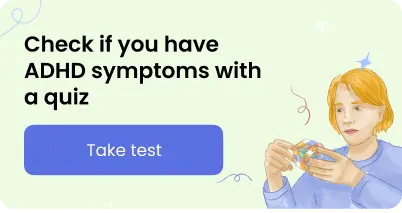Charles Darwin, Emily Dickinson, Richard Branson, and Thomas Jefferson. While some of them openly talked about their differences in cognitive functions, scientists continue to develop theories about others. Anyway, all these people lived with symptoms of neurodivergence, which may have enabled them to bring unique perspectives to their fields.
You can also be one of the neurodivergent individuals without even knowing it. Keep reading to find out more about neurological differences and how they might influence your daily life.
What does “neurodivergent” mean?
“Neurodivergent” is an umbrella term that describes a person whose brain works differently from what’s considered “typical.” Typical neurodivergent conditions may include autism spectrum disorder (ASD), ADHD, dyslexia, and dyspraxia. However, neurodivergence isn’t a single definition, and it covers a wide range of ways people think, learn, process information, and interact with the world.
About 15-20% of the global population experiences some form of neurodivergence. [1] This non-medical term was created to highlight that there’s no “normal” or “abnormal” human brain functioning. All differences are natural and can even empower the person.
On the other hand, neurotypical people are those whose brain function doesn’t fall outside of what’s considered typical for our society. Here are the main differences between them and neurodivergents.
| Neurodivergent | Neurotypical |
| Has unique ways of thinking and processing. | Functions within the commonly expected range of cognitive patterns. |
| May have non-traditional learning styles. Can be very creative. | Adapts easily to standard learning and working environments. |
| Might be more direct and literal. | Easily picks up on social cues, tone, and implied meanings. |
| Emotions can feel too intense. | Typically manages emotions within expected ranges. |
| Strengths can include creativity, honesty, deep focus, and resilience. | Among the strengths are consistency, predictability, social fluency, and ease of communication. |
Have you ever thought that you might be neurodivergent?
Types of neurodiversity (neurodivergent conditions)
People with neurodiversity may also experience some developmental disorders. The most common ones include:
Attention-deficit/hyperactivity disorder (ADHD)
ADHD is a mental condition characterized by inattentiveness, hyperactivity, and impulsivity. It stems from a combination of genetic, neurological, and environmental factors. Around 4.4% of US individuals live with ADHD [2], including such celebrities as Tom Holland, Michael Phelps, and Greta Gerwig. People with ADHD may struggle with focus and organization, but often show creativity and high energy.
Autism spectrum disorder (ASD)
ASD is a developmental condition that affects social communication and sensory processing (particularly sensitivity to certain sounds, textures, or lights). People with autism spectrum disorder may have very specific, persistent interests and excessive attention to detail.
Autism and ADHD Overlap (AuDHD)
Some people may experience two conditions at once. This phenomenon is unofficially referred to as AuDHD. This overlap can involve inattention, impulsivity, communication difficulties, different learning styles, stimming behaviors, and sensory overload.
Dyslexia
It is a learning disability that affects a person’s reading or writing skills. Dyslexia is linked to differences in how the brain processes language and is not related to intelligence. Studies prove that it’s mostly heritable, but the environment can also play a role in the development of the disorder. [3] Well-known people with dyslexia include Jennifer Aniston and Keanu Reeves.
Dyspraxia
This condition is characterized by challenges with motor skills and coordination. People with dyspraxia may struggle with tasks like writing, sports, or everyday movements but can excel in strategic thinking. Daniel Radcliffe is, probably, one of the most famous actors with dyspraxia.
Tourette syndrome
It is a condition that can cause unwanted rapid movements or vocal sounds that a person can’t control. While it can bring some challenges in social life, people with Tourette syndrome may have a strong focus and be rather creative.
Expert Insight
“Remember that neurodivergence exists on a spectrum! While you may not be ‘diagnosed,’ people exist all across the spectrum, and it doesn’t mean that you can’t have symptoms and ways to cope with those symptoms! At the end of the day, if you see yourself somewhere in this, just understand that you’re not alone and that it’s okay to advocate for your needs and comfort!”
Ian Pearson
Mental health professional
A person can live without any developmental disorder and still be neurodivergent. What’s more, some of us don’t even notice the signs of being neurodivergent and consider ourselves neurotypical. This only proves that there aren’t identical brains and their “normal” capabilities; each person is different.
Neurodivergent symptoms and traits
While human diversity is pretty high, there are common signs of neurodivergents that distinguish them from others. Their brains work in unique ways and process information and emotions differently from what’s considered typical.
1. Sensory sensitivities
If you feel too sensitive and overwhelmed every time you enter a crowded store, this might be one of the signs of neurodivergence in adults. But don’t jump to conclusions. Anyone can experience overstimulation because of sensory stimuli like bright light, loud noises, or high or cold temperatures. And anyone can feel uncomfortable at the end of a long day in a chaotic metro station.
Still, many neurodivergents tend to experience overwhelm and face the challenges connected with it more often. While some don’t even notice such background distractions, for others, they can be completely draining.
2. Emotional intensity & dysregulation
Emotional dysregulation is a hidden part of the ADHD iceberg, which means that you can have difficulties controlling your emotional responses. It can have some of the most common manifestations.
- A shutdown is when a person becomes emotionally numb or detached in reaction to overwhelming stress or trauma.
- A meltdown is a response characterized by a loss of control. From anger outbursts to uncontrolled crying, this can make life more complicated.
You may feel extremely sad when you hear even the slightest criticism at work. Or anxiety can take over when you have to speak in front of a group. Next time, instead of thinking about why you are so emotional, analyze your everyday life a bit deeper.
3. Social interaction challenges
Neurodiverse people may experience social anxiety and feel stressed in daily interactions. In particular, they may find it challenging to:
- Maintain eye contact
- Understand nonverbal cues, such as facial expressions or body language
- Engage in group conversations where multiple people are talking at once
- Make small talk
- Listen to other people without interrupting
- Use certain communication methods, like phone calls
While some people may consider those with neurodivergent traits rude, in reality, they might be confused. In many situations, neurodivergents simply don’t understand traditional “rules” of social communication.
Some people living with neurodiversity can mimic the behavior of their neurotypical peers. Nonetheless, this may lead to significant stress and anxiety as they continuously navigate social situations that do not come naturally to them.
4. Executive function difficulties
Executive functions are a combination of cognitive processes and mental skills that allow us to plan, concentrate, complete tasks, and reach our goals. Compromised executive functioning is one of the main symptoms of neurodivergent individuals. Here are the most common challenges that such people may face:
- Poor time management, particularly difficulties with understanding how long a particular task will take
- Struggling to plan things to work effectively
- Difficulty remembering instructions and details
- Poor multi-tasking skills
- Getting distracted easily
- Challenges in adapting to new situations or shifting focus
- “Time blindness,” or losing track of how much time has passed
5. Attention differences
There’s no middle ground: neurodivergents either get distracted super easily or hyperfixate on specific interests for weeks.
One side of the coin is when a person experiences difficulty focusing, procrastinates, and jumps between tasks without finishing them. This is particularly true for those with ADHD, but anyone with neurodiversity can have attention differences.
The other side of the coin is hyperfixation. When people with neurodiversity symptoms find something interesting, they can dwell on it for days, weeks, and even months.
While it sounds pretty productive, people with hyperfixation can forget about anything else, from doing work tasks to eating or taking a shower. Moreover, recovering from such an episode may feel like waking up from a deep, all-consuming trance that leaves a person disoriented.
6. Repetitive behaviors
Self-stimulatory behavior that involves repetitive movements (also called “stimming”) is a self-regulation mechanism. People who experience symptoms of being neurodivergent can use it to cope with emotions.
For instance, some might engage in rhythmic hand-flapping, finding comfort in the repetitive motion. Others may opt for meticulous routines, like arranging objects in precise order or compulsively checking things multiple times. Rituals like taking the exact same route every day or eating foods in a particular sequence are also common.

Positive neurodivergent traits
There are many positive aspects of neurodivergence. These people have unique strengths that can breathe fresh air into both personal and professional settings.
7. Ability to stay focused for long periods
Extreme focus can feel like a blessing, not a curse. Those who experience neurodivergent ADHD symptoms can be highly concentrated on things they are interested in, which can lead to extraordinary achievements.
An essential skill here is to learn to hyperfocus rather than hyperfixate. You can channel your concentration towards productive tasks with a clear goal in mind. In this case, people dive deep into something, driven by the desire to accomplish a goal. What’s more, for those who hyperfocus, the task shouldn’t necessarily be immediately enjoyable.
8. Outside-the-box thinking
An unconventional point of view is one of the powerful signs of neurodivergence in adults and children. As the minds of neurodivergents process information differently, they can come up with fresh solutions and ideas.
“Neurodiversity may be the birthplace of some of humanity’s greatest minds.” — Harvey Blume, journalist.
According to British psychiatrist Michael Fitzgerald, Albert Einstein and Isaac Newton could have Asperger syndrome, which is a form of high-functioning autism spectrum disorder. This means that thanks to their nonlinear thinking and different way of processing information, we now use the theory of relativity, mass-energy equivalence, laws of motion, and universal gravitation.
Usually, you can notice it even among neurodivergent toddler symptoms. Unique cognitive skills may cause kids to develop differently. While this may bring some problems to parents, it can also help a child in their future life.
9. Attention to detail
As we experience too many stressors and stimuli daily, staying focused can be difficult. And it can be even more complicated to notice minor details. But neurodivergents see the world differently. Their observation skills and ability to recognize patterns can make them look like natural detectives. They can effortlessly spot nuances and connections that others might overlook.
As a result, neurodivergent brain symptoms open up great opportunities in various fields. From data analysis to engineering, from entrepreneurship to art and design — they can find their place in so many areas.
10. Empathy and compassion
People living with neurodivergent traits can build strong and healthy relationships that are filled with empathy and compassion. Whether with friends, family, loved ones, or strangers on the streets, many of them are greatly warm-hearted.
For example, in the Netflix series “The Good Doctor,” Dr. Shaun Murphy is a surgical resident who has autism and savant syndrome. Despite facing skepticism and challenges in the medical profession, he is exceptionally empathetic towards his patients. Shaun’s ability to see things differently, combined with high emotional intelligence, helps him foster deep connections with those he treats. As a result, this is one of the neurodivergent character examples who excels in his profession.
11. Problem-solving skills
Thanks to nonlinear thinking and attention to detail, people with neurodivergent symptoms can look at problems from a different angle. By embracing unconventional solutions, neurodivergent employees can bring groundbreaking advancements in various industries.
Imagine a situation: A family deals with the daunting task of organizing a cluttered garage. A neurotypical person might start by sorting through boxes and planning where to place them. Meanwhile, neurodivergents can suggest ideas that others might overlook, like hanging bicycles from the ceiling to free up floor space or using shoe boxes to store gardening tools.

Neurodivergent signs and symptoms in young adults vs. children
As the human brain keeps forming, the manifestations of neurodiversity can change over time. Here’s how symptoms may look differently in adults compared to children.
| Aspect | Children | Adults |
| Social interactions | Have trouble making or keeping friends; like to play alone. | Experience social fatigue after interactions; may “mask” behaviors to fit in but feel exhausted afterward. |
| Communication | May have delayed speech or an unusual tone; might have trouble following multi-step instructions. | Prefer written over verbal communication; struggle with sarcasm or social cues. |
| Attention & focus | Get easily distracted and fidgety. Have difficulty sitting still. | Have trouble maintaining focus on long tasks and experience procrastination and hyperfocus. |
| Sensory sensitivities | Experience sensory overload because of noise, textures, clothing tags, or lights. | Use sensory tools (headphones, fidget items) to self-regulate. |
| Routines | Have a strong need for predictable routines. | Rely on structure and planning to manage daily life. |
| Learning styles | May succeed in one area but struggle in others. | Might experience imposter syndrome or self-doubt despite competence. |
| Coping | Depend on parents/teachers for structure. | Try to stay organized, but may struggle with self-care routines. |
Signs you may be neurodivergent and self-check quiz
If you don’t have an official diagnosis but suppose that you might experience some traits associated with neurodiversity, it may be helpful to engage in self-reflection. Answer the following:
- Do noise, light, or crowds feel overwhelming for you?
- Do you find it challenging to focus on tasks that don’t interest you?
- Do you feel anxious when plans change?
- Do you feel exhausted after communicating with others?
- Do you have issues with time management?
- Do you feel different from most people around you, even if you can’t say why?
A lot of “yes” answers can signal that you might have neurodivergent traits. To get more clarity, take a neurodivergent test in the Breeze app. Here, you’ll find out more about your experiences and possible related conditions, while personalized insights will give you more clarity on how to handle them effectively.
How do you know if you are a neurodivergent person?
Only a mental health professional can help you accurately identify and understand neurological differences you might live with. Thus, if you notice some difficulties with daily functioning and suppose that you might have unique strengths typically associated with neurodivergence, contact your healthcare provider.
After a thorough assessment that might include interviews, questionnaires, and cognitive tests, a specialist can find that you live with a certain medical condition. You may also just have some traits that neurodivergent people experience without meeting the full diagnostic criteria.
In any case, after getting diagnosed, a mental health professional can help you develop coping strategies and find the right support to make everyday life more comfortable.
Frequently asked questions
The term “neurodivergent” is used in an inclusive society to describe people who experience the natural variations in brain functioning. It aims to highlight that neurodiversity is not a disorder but rather a different way of perceiving the world, which only empowers society.
What are common traits among neurodivergent people?
People living with neurodiversity may experience difficulty focusing, constant seeking of sensory input (like fidgeting or stimming), and challenges with executive function. It also brings its unique benefits, like unique problem-solving skills, attention to detail, and outside-the-box thinking.
What are neurospicy symptoms?
“Neurospicy” is a slang term used in the neurodiversity movement. It means the same as “neurodivergent” and highlights similar patterns.
Can you be neurodivergent without ADHD or autism?
Yes, it isn’t necessary to experience autism, ADHD, dyslexia, or dyspraxia to be neurodivergent. Neurodiversity refers to a broad spectrum of brain differences that may include other mental health conditions (like dyscalculia or Tourette syndrome) and specific cognitive traits.
How do I know if I’m neurodivergent?
It’s better to visit a healthcare provider or a licensed therapist to get a diagnosis. Meanwhile, you can always start by taking the Breeze test to discover how likely you are to be neurodivergent.
Are there any support groups for neurodivergent people to improve mental health?
Yes, you can find supportive environments and groups in your area or online to connect with people who share similar experiences. In particular, Wrong Planet and The Neurodiversity Alliance are online communities that can help you find like-minded peers.
Sources
- Hutson, Piper & Hutson, James. (2023). “Neurodiversity and Inclusivity in the Workplace: Biopsychosocial Interventions for Promoting Competitive Advantage.” Journal of Organizational Psychology.
- National Institute of Mental Health. “Attention-Deficit/Hyperactivity Disorder (ADHD)”
- Fletcher JM. “Dyslexia: The evolution of a scientific concept.” J Int Neuropsychol Soc. 2009
Disclaimer
This article is for general informative and self-discovery purposes only. It should not replace expert guidance from professionals.
Any action you take in response to the information in this article, whether directly or indirectly, is solely your responsibility and is done at your own risk. Breeze content team and its mental health experts disclaim any liability, loss, or risk, personal, professional, or otherwise, which may result from the use and/or application of any content.
Always consult your doctor or other certified health practitioner with any medical questions or concerns
Breeze articles exclusively cite trusted sources, such as academic research institutions and medical associations, including research and studies from PubMed, ResearchGate, or similar databases. Examine our subject-matter editors and editorial process to see how we verify facts and maintain the accuracy, reliability, and trustworthiness of our material.
Was this article helpful?








